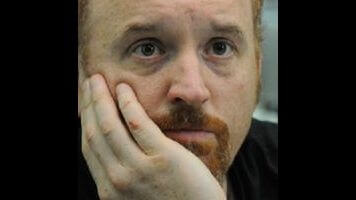Louie: "Joan"

In the wonderful Martin Scorsese documentary Public Speaking, the writer and bon vivant Fran Lebowitz talks about how AIDS robbed us of multiple generations of great artists but it also robbed us of a great audience, an audience that was open-minded and well-read and witty and loyal and devoted. In other words, AIDS killed Lebowitz’s ideal audience, an audience that got her intuitively and both challenged and rewarded her.
Watching “Joan”, the latest episode of the now Emmy-nominated Louie (woo hoo! Can we get a best comedy and some more writing nods next time?), I thought a lot about Lebowitz’s comments about losing a great audience. Artists don’t pick their audiences: audiences pick artists. And sometimes casinos engineer shotgun marriages between audiences and artists that fuck over both parties.
That is the case in “Joan.” The episode finds Louie dying a very public death at the hands of audience apathy and the infernal ringing of slot machines while performing a disastrous set at a room in a Donald Trump-owned casino. Dead-eyed, sad-faced drones glare at him from the audience. An open door to the casino provides a constant reminder that C.K is there in the service of commerce and nothing more.
C.K is dying because he’s playing for the wrong audience. Instead of a comedy geek audience or an audience of fellow comedians, he’s playing for gamblers who could give a fuck about C.K and his issues and came to the show simply because the tickets were free.
When he can’t turn around the set either by getting the offending door shut or self-deprecatingly referring to himself not being funny (a comment that earns a round of mocking, sarcastic laughter from the sneering crowd) he turns on the crowd and begins heckling them for giving their hard-earned money to a billionaire who could care less whether they live or die.
In another context, C.K’s turn might come off as righteous or cathartic; here, it registers as an act of desperation from a drowning man behaving in a flagrantly unprofessional fashion. After the show finishes, the manager diligently rattles off every provision in C.K’s contract he violated with his foul-mouthed rant against Trump.
I love the way this scene was handled. The manager didn’t blow up at C.K. He wasn’t apoplectic. He didn’t view C.K’s act as an unforgivable affront. He’s just a stand-up guy doing a job who understandably expects C.K to do the job he is being paid handsomely to do. The man who reads Louie his contract provisions is one of the show’s great finds, a guy who has really lived and invests each line with authenticity and conviction. His chemistry with C.K is terrific. Though he’s only onscreen for about a minute, we feel like we know this guy, that we can imagine his house and the pictures of his grandchildren on his mantle place.
To its credit, Louie understands that its protagonist is not Lenny Bruce. He is not speaking truth to power. Heck, the episode opens with an extended bit about having terrible diarrhea so C.K can’t claim the moral high ground in his passive-aggressive, one-sided war with the minions of Donald Trump.
In a funk, C.K wanders over to the big room, where a rejuvenated Joan Rivers is absolutely killing with routines about the geriatric, elephant-skin like nature of her genitalia. In a move both corny and endearing, “Joan” flashes several times deliberately to C.K laughing at Rivers’ act. It’s not particularly necessary but it is a nice show of respect from one generation to another.

 Keep scrolling for more great stories from A.V. Club.
Keep scrolling for more great stories from A.V. Club.